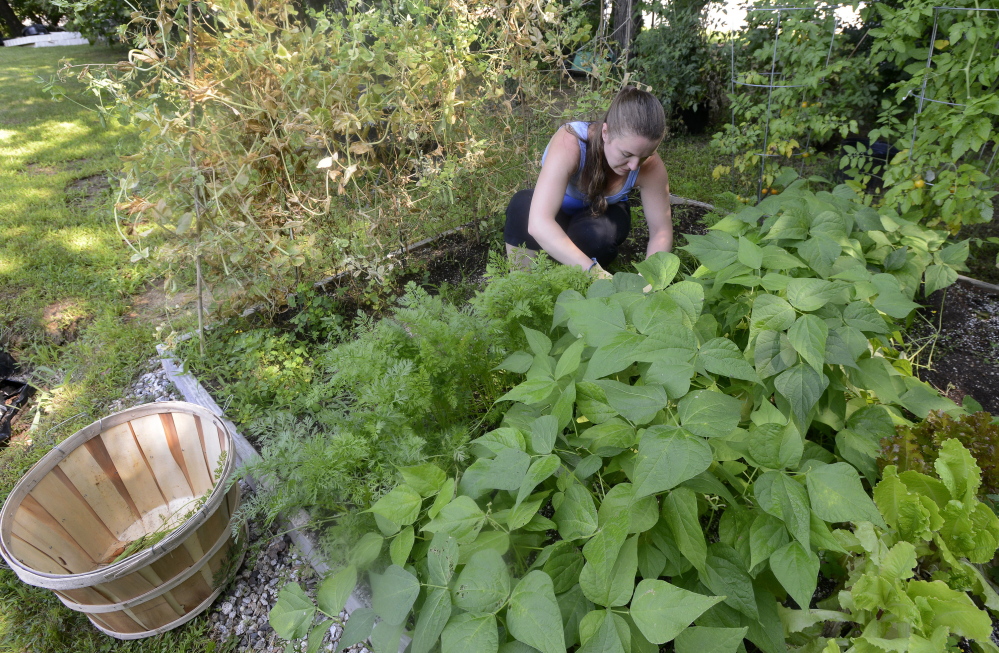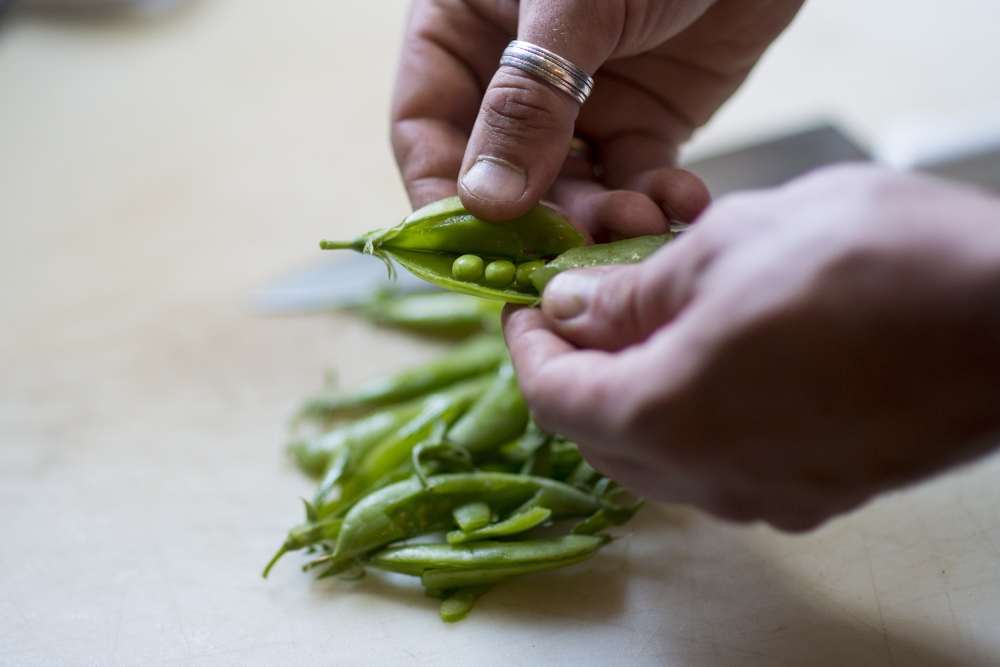Stephanie Ladd turned her green beans and peas into French toast last weekend.
This was not an act of magical gardening. Ladd is one of the home gardeners taking advantage of a garden-barter program at Gather restaurant in Yarmouth. Owner Matt Chappell put out the word in late July that he was looking to trade restaurant credit for produce, and Ladd heard about it from a friend.
“I have a green thumb,” she said. “And I kind of can’t stop. I have more than I am able to eat myself.”
She sold $23 worth of beans and sugar snap peas to Gather. When she came to Sunday brunch – which she declared “wonderful” – she brought 6 pounds of beans and 2 pounds of peas and left with yet another credit. “Incentive to come back,” she said.
Chappell had first heard of the garden-barter notion from an employee who had worked at the Beehive Café in South Bristol, Rhode Island, which has a similar system (dubbed the “Beehive Barter”). He had filed away the idea for the future until a man walked into the restaurant earlier this summer with a jumbo supermarket bag filled with fresh radishes and some garlic scapes.
“The were gorgeous,” Chappell said. “Bright red and with gorgeous greens.” The man – “I think his name was Ken,” Chappell said – told him he had grown them and just didn’t want them to go to waste. Chef Bryan Dame went to town on those radishes, quickly turning them into material for salads that evening as well as pickles for later. He even braised the greens and served them as a side dish.
Soon after, Chappell put up a list of sought-after veggies and their market prices (Have too many baby carrots? $1.25 a pound. Eggs? $3 a dozen) on Facebook and invited all gardeners to come visit during suggested hours (Tuesdays and Fridays between 11 a.m. and 2 p.m. and Wednesdays 4 p.m. to 5:30 p.m.).
“I can tell you that the people who have come in have not come in during those hours,” Chappell said. “My attempt to have hours was futile. But I didn’t want to dump this on the chef. He’s equally excited by it, but it doesn’t make life easier. Actually it makes it more challenging.”
But, Chappell said, the unpredictability is worth it.
“I don’t think it is going to transform the way we do business in any way or take away from our regular suppliers in any significant way,” he said. (Gather gets lettuces twice a week and one delivery of other produce a week.) “But it is still a fun way to engage people around town and beyond.”
Gather appears to be the first restaurant in Maine doing a direct exchange of restaurant credit for home gardeners’ crops, but it is likely, given the well-practiced Maine bartering system, that there are less formalized swaps going on elsewhere (at least one Harpswell resident traded his first asparagus of the season for fish chowder at his favorite farm stand).
Over in Putney, Vermont, the Gleanery, a 70-seat restaurant and café that built its business on the idea of taking imperfect, unsellable vegetables and fruits from area farmers and turning them into restaurant cooking, is also giving credit to home gardeners who supply them. Chef and owner Alice James said the kitchen staff also picks from gardens of customers who are out of town and don’t want their ripe produce going to waste. One gardener who deliberately grows more than he needs accumulated a $500 credit at the Gleanery since it opened in late 2012.
Cultivating these customer relationships is part of the restaurant’s mission, James said, and when the servers describe a dish at the table, they take care to identify where everything came from. “The gardeners get really excited to see their items on the menu,” James said.
For restaurants with nearly daily deliveries or gardens on premises, produce fresh from a local garden – Ladd lives just a few blocks away from Gather – wouldn’t be a special treat. But Gather has limited outdoor space, and this summer’s garden is limited to a few herbs, like tarragon, chives and oregano. Dame said he’s just as happy to not have responsibility for a full restaurant garden. “I’ve done it and it is a pain,” he said.
Gather’s staff hasn’t had to turn anyone away for, say, blemished cucumbers or overripe peas. “My guess is it probably won’t happen, mostly because the kind of people that are bringing this in are gardeners who take great care and are very proud of what they bring in,” Chappell said.
Dame said he’s enjoying adding in a few random deliveries of seasonal foods to his nightly menus. It’s a treat to grill green beans that were in the garden just hours before and he’s happy to pickle what he can’t use immediately for dishes this fall and winter. Gather has told its customers that surprises are more than welcome, as long as they are washed, and they haven’t put anything on the don’t-want list. Not even the home gardener’s most reliable vegetable. People joke that you shouldn’t leave your car unlocked in summer or you’ll end up with some home gardener’s extra zucchini. But at Gather, they’ll be happy to turn that into zucchini carpaccio – sliced thin and roasted – at an exchange rate of $1.25 per pound. This week, Ladd was already planning her next trip up the street, armed with zucchini.
Contact staff writer Mary Pols at 791-6456 or:
mpols@pressherald.com
Send questions/comments to the editors.




